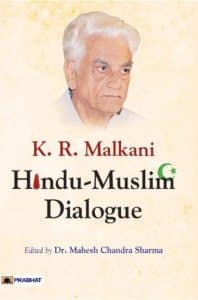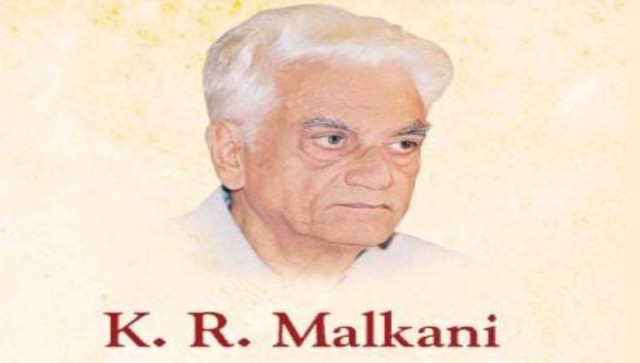The valediction centenary of one of the most illustrious sons of Bharat, KR Malkani, falls on 19 November 2022. A doyen of Indian journalism, an intellectual par excellence, the first man to be arrested under draconian MISA after Emergency was imposed in 1975 and a staunch nationalist. Malkani, who was born in Sindh, had joined Rashtriya Swayamsevak Sangh (RSS) at a young age. At the insistence of the then Sarkaryavah (General Secretary) of the RSS, Eknath Ranade, he left a promising career with the mainstream media in 1947-48 to become the first editor of the weekly Organiser. Malkani edited this weekly for almost four decades and made it the most authentic vehicle for those who wanted to know anything about the RSS’ perspective on a range of issues. Malkani was a multi-dimensional personality and one of the leading nationalists who played an instrumental role in at least three historical events. One of them is the beginning of a debate on the Hindu-Muslim relations in post-independence India which is an important context to understand the long-term view point and perspective of the RSS on this issue. But before we discuss this aspect of Malkani’s works, let us have a look at the two other events in which Malkani played an instrumental role. Malkani vs Nehru Around seven decades ago, the first amendment to the Constitution of India was brought in by the then Congress government headed by Prime Minister Jawaharlal Nehru. This amendment, in addition to bringing sweeping changes in laws related to socio-economic issues, also drastically curbed the freedom of speech. One of the immediate triggers for restricting freedom of expression by Nehru was primarily the battle between him and Organiser, an English weekly backed by the Rashtriya Swayamsevak Sangh (RSS). The Organiser under the editorship of Malkani was critical of the policies of the Nehru government in wake of the partition of India in 1947 and widespread communal violence against Hindus in Dhaka and several other parts of Pakistan. Unable to take the scathing criticism of this weekly, a furious Nehru decided to impose censorship on it. On 2 March 1950, the Central Press Advisory, a regulatory body under the Nehru government met and issued an order on the same day to gag the weekly. The order was issued by the Chief Commissioner of Delhi. It was a ‘pre-censorship order’ that was issued under the notorious East Punjab Public Safety Act. This order made it mandatory for the editor and the publisher to submit to the government for approval, all content related to communal issues or Pakistan. It didn’t even spare the cartoons! Malkani, the editor of Organiser, didn’t succumb to the pressure. He hit back at this gagging order with a bold editorial on 13 March. “If the administration earnestly wants ugly facts not to appear in the press, the only right and honest course for it is effectively to exert itself for the non-occurrence of such brutal facts,” the editorial read. “Suppression of facts is no solution to the Bengal tragedy. Surely the government does not hope to extinguish a volcano by squatting more tightly on its crater.” On 10 April 1950, Organiser’s publisher and printer, Brij Bhushan, and Malkani went to the Supreme Court to get the pre-censorship order quashed. The Supreme Court gave its verdict in this case on 26 May 1950 in favour of Organiser, quashing the pre-censorship order. Following this defeat of his government in the court, Nehru then pushed for introducing more curbs on freedom of expression through the first amendment. Despite fierce resistance from within his party as well as in parliament and media on the issue of freedom of expression, Nehru moved the Constitution (First Amendment) Act, 1951, on 10 May 1951 and it was enacted by Parliament on 18 June 1951. Malkani and Emergency Indira Gandhi had imposed Emergency in India on the night of 25-26 June, after she lost a case in Allahabad High Court which declared her election null and void and disqualified her from contesting for six years. Malkani, editor of Motherland, a daily English newspaper, was a fierce critic of Indira Gandhi. Not surprisingly, he was the first person to be arrested under Emergency from his Delhi residence at around 2.30 am on 26 June. Motherland, however, was able to bring out a special supplement by the 26 June afternoon that exposed Indira Gandhi’s move to impose Emergency in detail. This was a historic edition and was in such huge demand that a single copy was sold at Rs 20, a princely sum for a newspaper copy at that time. It was the only newspaper on 26 June that published detailed stories on ‘Emergency’ and made the whole nation and the world aware about it. Malkani spent 18 months in jail and later wrote a fascinating first-hand account of the saga of Emergency under the title The Midnight Knock. Hindu-Muslim dialogue [caption id=“attachment_11658561” align=“alignnone” width=“198”] Cover page of book: K R Malkani Hindu-Muslim Dialogue. Prabhat Publications[/caption] A recently released book, KR Malkani: Hindu-Muslim Dialogue (Edited by Dr Mahesh Chandra Sharma; Prabhat Prakashan) carries interesting and relatively less known details about Malkani’s initiative that resulted in a healthy debate on the possibilities of a ‘Hindu-Muslim’ dialogue. The discussion initially kicked off with Malkani penning a separate chapter (Muslims: A New Perspective) in The Midnight Knock in 1979. This was followed by a research paper that he wrote and published in the prestigious research journal Manthan (published by Deendayal Research Institute) in its June 1988 edition. Malkani was also the editor of this journal at that time. The research paper he published in it was titled ‘Resolving Religion Cultural Differences in the service of the Indian people.’ According to Dr Sharma, “Copies of this were sent out to more than a hundred intellectuals of the country followed by a splendid but sensible and insightful debate.” The first reaction to this research paper came from noted Muslim intellectual Asghar Ali Engineer that was published in daily newspaper ‘The Indian Express’ on 7 July 1988. He wrote: “I am happy and astonished to learn that Shri KR Malkani of Deendayal Research Institute has prepared an essay so as to have discussion with the Muslims… The representative organisations of the Muslims should also draft similar documents for discussion with the Hindus.” Engineer prepared a detailed document on this subject that was published by Malkani in the September, 1988 issue of Manthan. The essay was titled ‘Hindu-Muslim Problem: A cooperative approach’. It wasn’t only Engineer who responded to Malkani’s research paper. A number of illustrious personalities shared their responses that included KS Sudarshan and HV Seshadri. Sudarshan who became the fifth Sarsanghchalak was ‘Baudhik Pramukh’ (Chief of intellectual activities) while Seshadri was Shah-Sarkaryavah (joint general secretary) of the RSS at that time. Dr Sharma says, “The perspectives of these three senior leaders of Sangh — Shri Malkani, Shri Seshadri and Shri Sudarshan — also reveal the inner dialogue within the Sangh. Later inspired by Sudarshan and this spirit of dialogue an organisation of nationalist Muslims ‘Rashtriya Muslim Manch’ came into existence that took this dialogue further over the years. It also shows that the recent dialogue between the Muslims and the RSS leadership has a historical background and a strong contextual framework. Malkani played an instrumental role in shaping this framework recognising not only the contemporary but the future challenges for the country especially in context of Hindu-Muslim relations. The writer, an author and journalist, has written several books. He tweets @ArunAnandLive. Views expressed are personal. Read all the Latest News
, Trending News
,
Cricket News
, Bollywood News
, India News
and Entertainment News
here. Follow us on
Facebook
,
Twitter
and
Instagram
.
Cover page of book: K R Malkani Hindu-Muslim Dialogue. Prabhat Publications[/caption] A recently released book, KR Malkani: Hindu-Muslim Dialogue (Edited by Dr Mahesh Chandra Sharma; Prabhat Prakashan) carries interesting and relatively less known details about Malkani’s initiative that resulted in a healthy debate on the possibilities of a ‘Hindu-Muslim’ dialogue. The discussion initially kicked off with Malkani penning a separate chapter (Muslims: A New Perspective) in The Midnight Knock in 1979. This was followed by a research paper that he wrote and published in the prestigious research journal Manthan (published by Deendayal Research Institute) in its June 1988 edition. Malkani was also the editor of this journal at that time. The research paper he published in it was titled ‘Resolving Religion Cultural Differences in the service of the Indian people.’ According to Dr Sharma, “Copies of this were sent out to more than a hundred intellectuals of the country followed by a splendid but sensible and insightful debate.” The first reaction to this research paper came from noted Muslim intellectual Asghar Ali Engineer that was published in daily newspaper ‘The Indian Express’ on 7 July 1988. He wrote: “I am happy and astonished to learn that Shri KR Malkani of Deendayal Research Institute has prepared an essay so as to have discussion with the Muslims… The representative organisations of the Muslims should also draft similar documents for discussion with the Hindus.” Engineer prepared a detailed document on this subject that was published by Malkani in the September, 1988 issue of Manthan. The essay was titled ‘Hindu-Muslim Problem: A cooperative approach’. It wasn’t only Engineer who responded to Malkani’s research paper. A number of illustrious personalities shared their responses that included KS Sudarshan and HV Seshadri. Sudarshan who became the fifth Sarsanghchalak was ‘Baudhik Pramukh’ (Chief of intellectual activities) while Seshadri was Shah-Sarkaryavah (joint general secretary) of the RSS at that time. Dr Sharma says, “The perspectives of these three senior leaders of Sangh — Shri Malkani, Shri Seshadri and Shri Sudarshan — also reveal the inner dialogue within the Sangh. Later inspired by Sudarshan and this spirit of dialogue an organisation of nationalist Muslims ‘Rashtriya Muslim Manch’ came into existence that took this dialogue further over the years. It also shows that the recent dialogue between the Muslims and the RSS leadership has a historical background and a strong contextual framework. Malkani played an instrumental role in shaping this framework recognising not only the contemporary but the future challenges for the country especially in context of Hindu-Muslim relations. The writer, an author and journalist, has written several books. He tweets @ArunAnandLive. Views expressed are personal. Read all the Latest News
, Trending News
,
Cricket News
, Bollywood News
, India News
and Entertainment News
here. Follow us on
Facebook
,
Twitter
and
Instagram
.
Right Word | KR Malkani: RSS stalwart who took on Nehru-Indira and laid foundation for Hindu-Muslim dialogue
Arun Anand
• November 19, 2022, 15:19:12 IST
Malkani edited the ‘Organiser’ for almost four decades and made it the most authentic vehicle for those who wanted to know anything about the RSS’ perspective on a range of issues
Advertisement
)
End of Article